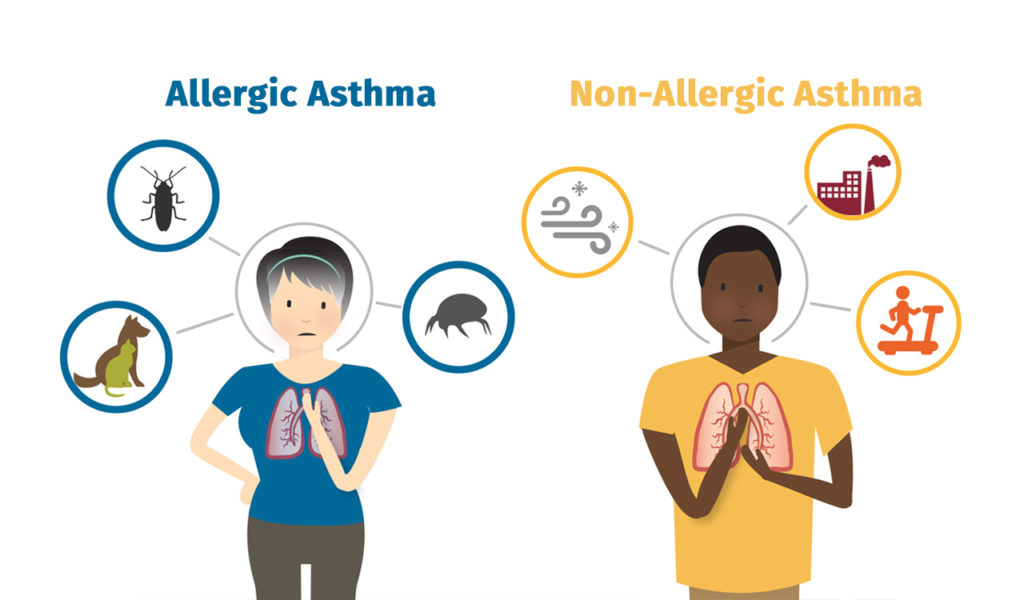Allergic asthma is the most common type of asthma. It’s estimated that around 90% of children and 50% of adults with asthma1 have allergies that trigger their asthma symptoms..
If you’re suffering from asthma, it’s important to know the particular allergens and substances that trigger it so you can prevent attacks more effectively. Here are some frequently asked questions (FAQs) about allergies and how they affect or induce a patient’s asthma episodes.
What’s an allergy and how do allergic reactions take place?
An allergic reaction happens when your immune system responds to an otherwise harmless substance that comes into contact with the body2. When the immune system detects allergens in your body, it wrongly recognizes these substances as harmful, and thus overreacts. This prompts the immune system to release chemicals that cause allergy symptoms such as nasal congestion, sneezing, itchy eyes, skin irritation, and runny nose.
Triggers are different from one person to the next, but they can be anything from pollen from plants, molds, dust mites, animal dander, food and food ingredients, chemicals, and others.
So, how is asthma related to allergies?
When allergies affect your airways – from your nose to your throat and lungs – they may cause symptoms of asthma. These symptoms may be mild at first. However, prolonged exposure to allergens can cause severe airway inflammation, which may then lead to difficulty breathing, bronchospasms, and endless coughing. Asthma caused by allergies is called allergic asthma or allergy-induced asthma3.
However, it’s important to remember that allergic asthma is just one variant of asthma. Although allergies are one of the most common risk factors of asthma, not all cases of asthma are caused by allergies. Other triggers include exercise, viral or bacterial infections, cold air and weather changes, and stress. Often, patients would have more than one type of asthma trigger, which puts them at an even greater risk of asthma episodes.
How would you know if you’re at risk of allergic asthma?
If any of your family members has a history of allergic asthma, allergic rhinitis or hay fever, and other types of allergies, you’re at increased risk of allergic asthma5.
It’s best to consult an immunologist or allergologist so you can undergo an allergy test and find out the substances you’re allergic to.
How can you prevent episodes of allergic asthma?
The only way to completely ward off allergic asthma is to avoid exposure to allergens. Following these steps can help you prevent asthma attacks:
– Keep your air conditioner clean. If it’s dusty or smells moldy, make sure to clean it before use.
– Stay indoors when pollen count in the atmosphere is high.
– When outdoors, make sure to wear a face mask so you don’t inhale any allergens such as dust, pollen, pet dander, and others.
– Wash your bedding regularly to keep dust mites away. It’s best to soak your bed sheets, blankets, and pillowcases in hot water before putting them in your washing machine.
– Control indoor humidity by investing in a dehumidifier. You may also measure humidity in your room via a cheap humidity meter. If it goes above 40%, a dehumidifier can help dry out the atmosphere, slowing the growth of molds and dust mites.
– Keep your home clean, especially the kitchen and bathroom areas, where molds may build up.
– As much as possible, keep your pets away from your bedroom to avoid exposure to animal dander.
If you can’t avoid allergens, taking your asthma inhaler and other medicines as advised by your doctor to prevent allergy and asthma flare-ups.
*Note that this article is not intended to be a substitute for professional medical advise, diagnosis or treatment. Always seek the advise of your doctor or other qualified health provider with any questions you may have regarding a medical condition.
——
[1] WebMd. Allergic asthma. Reference: https://www.webmd.com/asthma/guide/allergic-asthma#1
[2] American Academy of Allergy Asthma and Immunology. Allergic reaction definition. Reference: https://www.aaaai.org/conditions-and-treatments/conditions-dictionary/allergic-reaction
[3] Mayo Clinic. Allergies and asthma. They often occur together. Reference: https://www.mayoclinic.org/diseases-conditions/asthma/in-depth/allergies-and-asthma/art-20047458
[4] American Lung Association. Asthma risk factors. Reference: https://www.lung.org/lung-health-and-diseases/lung-disease-lookup/asthma/asthma-symptoms-causes-risk-factors/asthma-risk-factors.html

